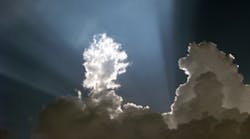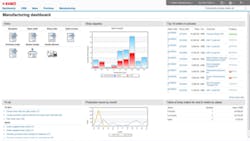We are witnessing an exciting transformation in U.S. manufacturing, with production and jobs returning to parts of the country overdue for good news. Perhaps more exciting is how the revival of domestic manufacturing is lifting smaller producers, companies like Dillaman Mold & Manufacturing in Meadville, Pa., which specializes in tooling for plastic injection molding machinery. Much of the recent expansion in domestic manufacturing can be credited to companies like Dillaman that are aggressively seizing opportunities for growth.
Even while that growth continues, success is not guaranteed. Small manufacturers cannot effectively compete if they are relying inefficient, paper-based systems that were a poor choice even during the last economic rise, half a decade ago. What’s more, without new technologies, on the shop floor and in the managers’ offices, manufacturers are likely to underperform during the current growth cycle. Worse than that, they’ll be unprepared for inevitable dips in the future.
Chad Dillaman, who owns Dillaman Mold & Manufacturing, has been an early adopter of technology and explained that he’s constantly looking for competitive advantage. He saw the potential advantage when “cloud computing” emerged as a next-wave technology. The promise of the cloud – that it would level the playing field by providing easier, more cost-effective access to business software – resonated with him.
“Small manufacturers struggle with unpredictability,” Dillaman explained. “Sometimes they’re overwhelmed with orders, while other times it’s painfully slow.
“With software, however, you can see what’s really happening inside the business – at a glance,” he continued, “and this enables you to take proactive steps to avoid frustrating production peaks and valleys.”
For Dillaman and other small manufacturers, software had always been something of a luxury. Larger companies touted major benefits, but they also acknowledged the significant costs and difficulties with implementation.
Everything You Need to Grow
Dillaman’s first experiences with on-premise software may have been better than most, but now he’s a believer in the greater versatility and cost-effectiveness of cloud-based solutions.
“My first piece of advice to small businesses is this: don’t be afraid to embrace new technology,” says Dillaman. “It can be intimidating at first, but once you get going, managing the business is far less complex; everything you need to grow and increase profitability is suddenly at your fingertips.”
His comfort level with technology has made him an early adopter of mobile tools, too. Today, he relies on smartphone apps to monitor production and help him make decisions from wherever he may be. While on a business trip, for example, he can see instantly that a foreman on the factory floor has used a tablet to update a job order. If he receives a customer inquiry about the job status while driving home, the answer – accurate up to the minute – is just a few clicks away.
“Instead of having to come into the shop on the weekends or when I’m traveling, now I can simply log-in to my system through any computer, anywhere, anytime,” said Dillaman. “I also have access to scheduling and quoting technologies that can automate time-consuming tasks that many small manufacturers still do manually.”
Cloud technology gives smaller manufacturers like Dillaman advantages that once took larger businesses months (if not years) to realize with costly and unwieldy ERP and CRM platforms. Without requiring extensive customization, which is how the costs begin to add up, a small manufacturer now has unprecedented visibility into job status, cost of production, inventory, and the up-to-date status of each customer. Today’s manufacturing software, enabled by the cloud, is much easier to implement and demands far less time and resources to “go live,” finally making it accessible to hundreds of thousands of small businesses in the U.S. alone.
Rapid Implementation, Results
The cloud makes accessing software faster, more flexible to organizational circumstances, and easier to execute. Within days, businesses like Dillaman’s have access to dashboards that show areas of strength, weakness, and opportunity, and all this is possible without painstaking number crunching.
Providing an order date and price no longer takes hours – during which time a competitive offer may arrive, and it’s now possible to space orders and plan production according to the most up-to-date inventory, order, and production statuses.
“Before moving to cloud-based manufacturing software, I couldn’t confidently quote a job, especially when it could be delivered,” Dillaman said. “Now, I can see in seconds what the status is and build a schedule that more efficiently spreads work. This lets us manage our manufacturing teams better and, most important, it ensures that we’re delivering the best customer experience possible.”
Beyond improved customer experience, these new software tools allow a user to understand better how to increase a company’s margin. Simply put: a clear understanding of how the business works helps the user to spot new opportunities with clarity. For example, Exact Online provides comprehensive CRM capabilities and visibility into cost of goods sold, enabling companies to better understand how to grow their potential customer base.
Technological Advantage
The worldwide market for cloud computing will grow 18.5 percent this year to $131 billion, according to analyst firm Gartner. What’s exciting about this transformation is how it’s enabling smaller U.S. manufacturers to more effectively compete in both the U.S and global marketplaces. The playing field is leveling, at least enough for smaller manufacturers to start thinking beyond “hanging on” and begin to plan for new growth.
Yes, larger enterprises had the first crack at new technologies such as ERP and CRM, but they also worked out many of the kinks, helping the industry develop better models for delivery and operation that benefit smaller manufacturers as well.
“Manufacturing software, enabled by cloud and mobile technologies provides a recipe for success for hundreds of thousands of small manufacturers like us,” said Dillaman. “The stage is now set for a new era of manufacturing opportunity and growth.”







